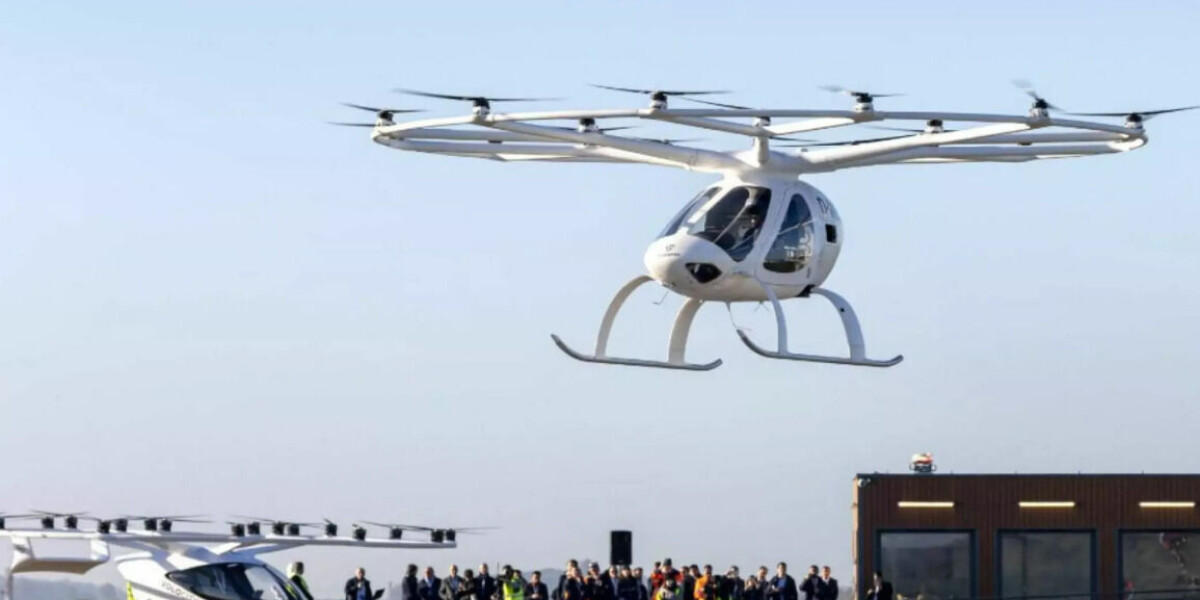
Go ahead for electric flying taxis during paris olympics
- Select a language for the TTS:
- UK English Female
- UK English Male
- US English Female
- US English Male
- Australian Female
- Australian Male
- Language selected: (auto detect) - EN
Play all audios:

THE TRIPS WILL BE 'DEMONSTRATIONS', AND THE SCHEME IS STILL BEING DUBBED AN EXPERIMENT Flying taxis will take to the skies during the Paris Olympics, it has been confirmed, after
the Transport Ministry authorised the creation of a helipad on the Seine - but the journeys will not be paid. The government this week authorised the installation of a floating helipad - a
temporary barge - on the Seine river, which will serve as a taking off and landing site for VoloCity helicopters. Created by the German start-up Volocopter, and brought to France by the ADP
Group (which runs Paris’ airports) and transport company RATP, the taxi company has long been pushing to bring its ‘flying taxis’ to the Olympics. Read also: Flying ‘drone taxis’ on track to
carry passengers at Paris Olympics Now, with just two weeks to go until the Olympics begin (on July 26), the taxis have been authorised to fly between: * Issy-les-Moulineaux and
Paris-Austerlitz * The Saint-Cyr-l'École aérodrome, and the airports of Le Bourget and Roissy-CDG. Read also: Flying taxi successfully tested in Paris ahead of 2024 Olympics
‘DEMONSTRATION FLIGHTS’ ONLY However, the group has not received authorisation from the European Union Aviation Safety Agency (EASA) nor the French civil aviation authority la Direction
générale de l’Aviation civile (DGAC) to take paying passengers during this time. This means that only ‘demonstration flights’ will be allowed during the Olympics, and the flying taxi scheme
is still being dubbed ‘an experiment’. The hours of operation will be limited to between 08:00 and 17:00. The number of flights will be capped at two per hour, and 900 flights total during
the experiment. VoloCity will not be able to charge passengers until after December 31, 2024 at the earliest, the government decree states. ‘ECOLOGICAL ABERRATION’ Some ministers in Paris
have criticised the government’s authorisation of the scheme, calling it an "ecological aberration". The Mairie of Paris is even considering legal action against the decree.
However, Valérie Pécresse, President of the Île-de-France region, is in support of the project. “It is a very good thing that this experiment can go ahead,” she told Le Figaro. The VoloCity
helicopters have a futuristic appearance, with a white body and circular loop where a helicopter’s blade usually sits. They are powered by electricity, and 16 small motors rather than one
large blade. This makes the helicopter less noisy than a typical vessel. The helicopters can carry two passengers including the pilot, flying at 100 kp/h at an altitude of 400-500 metres,
with a range of 35 km. The company is, however, working on automated helicopters that will fly themselves, and a larger five-seater edition. > Le taxi volant VoloCity de l’allemand
Volocopter, présenté à > Pontoise. Tests prévus sur l’aérodrome de Pontoise à partir de > juin 2021, dans le cadre d’un programme soutenu par la région > Île de France, ADP, la RATP
pic.twitter.com/txCCQ9Dpel > — Vincent Lamigeon (@VincentLamigeon) September 30, 2020 In 2020, before the helicopters were even officially tested in France, Ms Pécresse already said that
she hoped the flying taxis could be unveiled for the Olympic Games. This would make Ile-de-France “a reference point for the global market for urban air mobility”, she said. At the same
time, however, transport company RATP predicted that it would not be able to sell public tickets for the flights until 2030. Other companies to have tested flying taxis, including Airbus,
pulled out of the ‘Olympics race’ completely after realising they would not have their prototypes or aviation authorisation ready in time.
